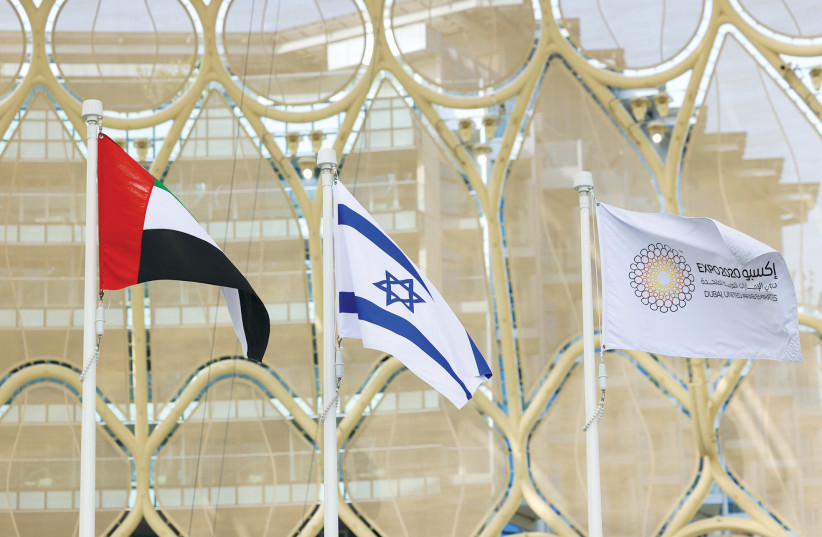Israel is caught in the crossfire of the US-China superpower rivalry – and that could jeopardize its regional economic aspirations and dreams of normalized ties with the Arab world.
Over the past decade, Gulf-China synergy has surged, especially in the tech sector. A series of meetings between Chinese President Xi Jinping and King Salman bin Abdulaziz Al Saud of Saudi Arabia in December, as well as the recent Saudi Arabia-Iran deal brokered by China, highlight the diplomatic importance of the economic bridge between the two regions.
At the same time, US-Saudi relations have become strained, concurrent with increasing tensions between Washington and Beijing.
The US expects its allies, including Israel, to activate a “supervised risk management system” to avoid the leakage of advanced technologies into China, Carice Witte, executive director of the SIGNAL (Sino-Israel Global Network & Academic Leadership) institute, told The Jerusalem Post.
How does this dynamic affect Israel?
The situation places Israel right at the center of this superpower rivalry. It will make it difficult for the Jewish state to realize the full economic potential of former president Donald Trump’s “Peace and Prosperity” deal. At worst, it could harden relations between Israel and the United Arab Emirates.

Over the past five years, the Middle East became increasingly important to China as an economic and geostrategic hub. Tech collaboration has become a powerful catalyst for furthering engagement with Bahrain, Kuwait, Oman, Qatar, Saudi Arabia and the UAE, the countries of the Gulf Collaboration Council.
Trade between China and these countries has grown from around $1.5 billion in 1990 to tens of billions yearly for the last 15 years. According to a report by the American Enterprise Institute, between 2005 and 2021, Chinese investments and construction projects totaled $1.42 billion in Bahrain, $11.75 billion in Kuwait, $6.62 billion in Oman, $43.47 billion in Saudi Arabia and $36.16 billion in the UAE. As a result, China is now the foremost trading partner of the GCC.
CHINA HAS become the region’s tap into technology, AI and data in exchange for a constant flow of reasonably priced oil; most of China’s oil imports originate from countries in the Middle East, especially Saudi Arabia.
For example, in 2017, China and Saudi Arabia struck a deal to manufacture CH-4 drones in Riyadh. And new Chinese artificial intelligence technology is supporting the establishment of a solar city in the kingdom.
These tech deals give Beijing leverage and influence in the region, which could add to US concerns, Witte said.
Most GCC telecom firms have signed 5G contracts with China’s Huawei company, including a 2022 agreement between Huawei and the Saudi Digital Academy to “advance local technological talent and realize the digital transformation — the use of artificial intelligence, cloud computing, cybersecurity and 5G - envisioned in Saudi Vision2030, Riyadh’s blueprint for economic diversification,” wrote N Janardhan, Anwar Gargash and Gedaliah Afterman, in an article published in the East Asia Forum.
The UAE decided to move forward with Huawei despite ending a potential deal with the US to receive F-35 fighter jets. Instead, the Emirates signed with the Chinese company and a few months later announced it would purchase Chinese L-15 advanced trainer and light combat jets instead.
Israel has pushed back a little against America’s ban on Huawei and allows some usage in the country. But it has followed the US lead in keeping the Chinese company away from its critical infrastructure, citing security concerns.
Israel cannot afford to lose the US as its most strategic security partner in defense technology development or diplomatic support, such as at the United Nations.
On the other hand, although Beijing expressed concern when the Abraham Accords were signed that the agreement could lead to a new security architecture for the Mideast, over time it saw the accords’ potential for contributing to achieving its geo-economic vision in the region.
Israel and the UAE already have developed several technology projects together, which China could want to tap into, upsetting its US rival because “whoever controls fourth generation industrial revolution technologies is going to have the edge in global leadership,” Witte said. Israel could therefore end up in the crosshairs between the US and China or limit its ability to actualize its full potential with the UAE.
The US is advancing its tech thinking on China by the week, as highlighted by the recent sweeping restrictions on sales of computer chip technology to the world’s most populous country. At the same time, China is becoming less needy of American technologies. In terms of artificial intelligence, 5G, quantum information science, semiconductors, biotechnology and green energy, the country has already surpassed US capabilities thanks to having exponentially more engineers than America, according to Harvard University’s Belfar Center for Science and International Affairs.
A report by the center said China is expected to overtake the US in other areas within the next 10 years.
As US pressure on China increases, the country is likely to move further into the Middle East, where the GCC countries who are aching to diversify their economies will welcome Chinese technologies with open arms.
For nearly 40 years, Israel has balanced its commercial and security interests between China and the US. But as Witte maintained, Israel must set policies to serve as a compass to guide it through the impending storm.
